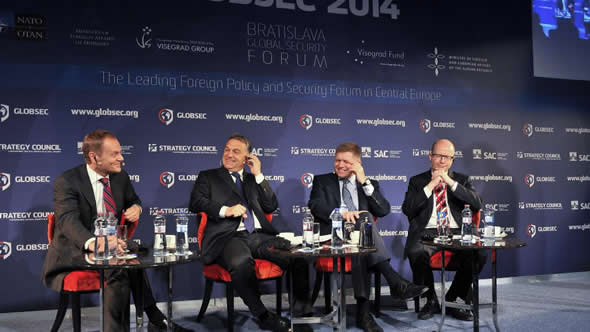Bratislava – ESI at Globsec

From 14 to 16 May 2014 ESI's Kristof Bender attended the 9th Globsec conference in Bratislava, Central Europe's most important security forum.
Given the developments in Slovakia's eastern neighbour, the crisis in Ukraine and the roles of Russia, the EU and NATO dominated the conference's agenda. There was no shortage of high-level participants, including five prime ministers, more than two dozen foreign ministers, and NATO Secretary General Anders Fogh Rasmussen.
There were also interesting assessments about Russia's intentions by some of the best informed analysts like Ivan Krastev from Sofia's Centre for Liberal Strategies, Andrei Illarionov, a former chief economic adviser to both Yeltsin and Putin who defected to the Cato Institute, and Timothy Snyder, author of the best-selling "Bloodlands. Europe between Hitler and Stalin."
Snyder drew on arguments he made in his article "The Battle in Ukraine Means Everything. Fascism returns to the continent it once destroyed":
"Putin's goal was and remains eminently simple. His regime depends upon the sale of hydrocarbons that are piped to Europe. A united Europe could generate an actual policy of energy independence, under the pressures of Russian unpredictability or global warming – or both. But a disintegrated Europe would remain dependent on Russian hydrocarbons."
Energy policy emerged also as the potentially most powerful tool against Russia at the EU's disposal. Polish Prime Minister Donald Tusk talked about his proposal of a EU energy union. As he wrote in a recent commentary in the Financial Times:
"Regardless of how the stand-off over Ukraine develops, one lesson is clear: excessive dependence on Russian energy makes Europe weak. And Russia does not sell its resources cheap – at least, not to everyone. This, of course, is basic economics. A dominant supplier has the power to raise prices and reduce supply. The way to correct this market distortion is simple. Europe should confront Russia's monopolistic position with a single European body charged with buying its gas."
Tusk earned many affirmative nods, including from some of his Visegrad-4 counterparts. The idea was brought up also in other sessions, including by Mario Monti, Italy's former prime minister.
One has to note, however, that with a few exceptions, most of the ministers and high-ranking participants at the conference were from the new member states and South East Europe. There was one MP from the UK on the speakers list. France had one MP and a foreign ministry official on the podium. There was no one to share Germany's official views. The conference was largely a gathering of the affected and interested. Unfortunately this does not include all of the EU.
- Globsec 2014 website
- Agenda
- Timothy Snyder, "The Battle in Ukraine Means Everything. Fascism returns to the continent it once destroyed", New Republic, 11 May 2011
- Donald Tusk, "A united Europe can end Russia's energy stranglehold", Financial Times, 21 April 2014
